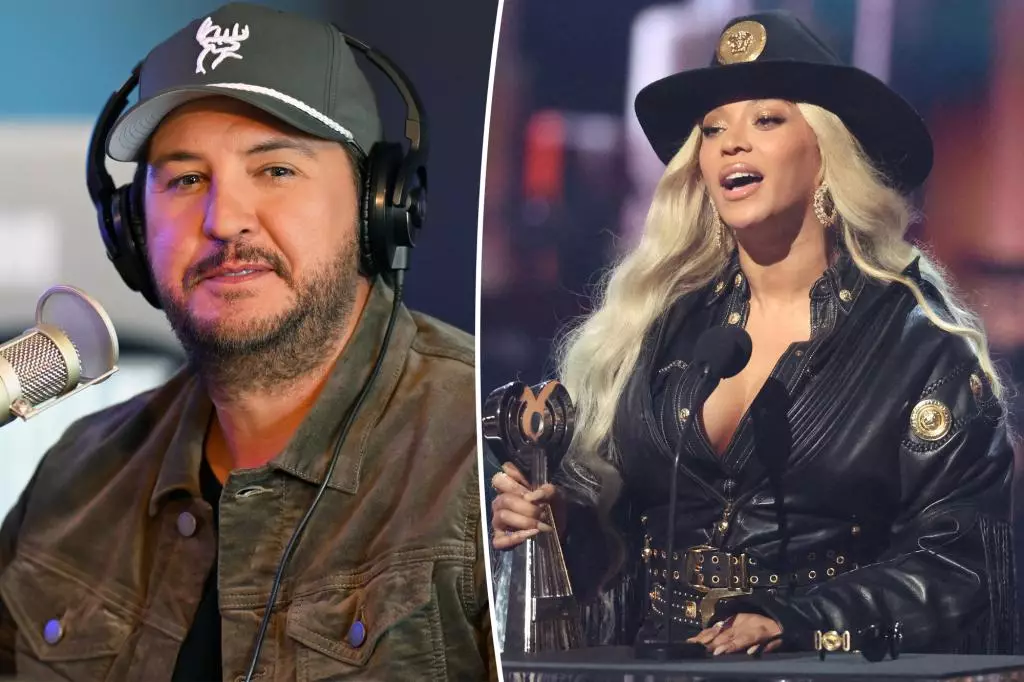Beyoncé’s foray into country music with her album *Cowboy Carter* has stirred a myriad of responses within the genre. Despite achieving significant commercial success, the absence of recognition during the Country Music Association (CMA) Awards nominations raised eyebrows, especially among her fan base known as the Beyhive. Luke Bryan’s recent comments on SiriusXM encapsulated the conflicting sentiments surrounding this situation. While he expressed appreciation for her contributions to country music, he suggested that for artists like Beyoncé to gain acceptance, they must immerse themselves in the traditional country culture, which often emphasizes familial bonds and community.
Bryan’s assertions indicate a broader tension that exists within the music industry regarding inclusivity. On one hand, there is an undeniable excitement surrounding artists crossing genre boundaries; on the other, there remains a seemingly strict adherence to established norms and behaviors that define traditional country music.
Bryan’s remarks highlight a crucial aspect of country music: its identity as a close-knit community. He posits that artists wishing to penetrate this insular world must engage not just musically, but personally. This desire for familial connection is significant in country music, where shared experiences and collective narratives often create the fabric of songs and performances. While there is validity in his perspective regarding the essence of community, it also raises questions about the nature of artistic expression and the barriers that genres inadvertently construct.
The critique of Beyoncé’s non-conforming aspects appears to reveal an underlying hesitation to fully accept artists who have not traditionally inhabited the country music sphere. By emphasizing her need to “come to an award show and high-five us,” Bryan unintentionally mirrors a broader societal expectation for artists to assimilate thoroughly into the cultures they seek to join, which can arguably stifle innovation and diversity.
The responses from established country artists like Dolly Parton and Kelly Clarkson further help to understand the nuances present in this debate. Parton defended the voting committee’s decision by acknowledging the breadth of talent within the country genre, suggesting that the snubbing of artists like Beyoncé is not necessarily an indictment of their work but rather a reflection of the community’s commitment to its entrenched artists. Clarkson’s perspective echoed this sentiment, recalling her challenges as an artist navigating genre barriers. Her insight into being pressured to abandon pop for country music illuminates the broader struggles that many artists face when attempting to shift genres.
These reflections from industry veterans capture the complexities that arise when artists cross into new territories. In a world increasingly defined by genre fluidity, the gatekeeping tendencies of traditional organizations like the CMA raise questions about whom they prioritize and the implications of such choices on the evolution of music.
Beyoncé herself has articulated her journey into the country genre with a level of introspection. In her own words, the challenges she faced were compounded by a sense of exclusion from a genre she wished to explore. She emphasizes that *Cowboy Carter* is a culmination of years of labor, passion, and a desire to understand and honor the history of country music. Her dedication to creating a work that blends genres is commendable, as it not only showcases her versatility but also underscores the rich tapestry that music can offer when artists are permitted to experiment and explore.
It’s important to recognize that Beyoncé’s effort goes beyond mere categorization. She steps into the country music world with gratitude and respect for its roots, aiming to contribute to an evolving narrative rather than merely borrowing from its tradition. Her experiences resonate with many who feel similarly constrained by the expectations of traditional music industries.
As discussions about genre boundaries continue, a critical evaluation of what it means to belong to a musical community is necessary. Bryan’s commentary, while rooted in a desire for tradition, also exemplifies the challenges that genres face in incorporating diverse voices within their frameworks. The responses from other artists reflect a growing recognition of the need for inclusivity in music, one that embraces different backgrounds and stories.
The conversation surrounding Beyoncé’s contributions to country music ultimately signals a call to evolution. As the industry grapples with its identity, it must also recognize that welcoming diverse influences can enrich the genre rather than dilute it. In this complex landscape, artists like Beyoncé remind us that music, at its core, is about connection—whether that connection is rooted in tradition or vibrant innovation.

